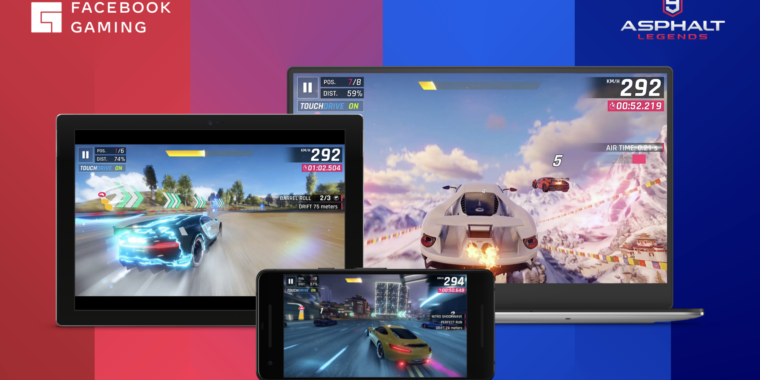
-
Facebook’s game-streaming is focused on mobile games, but the titles can also be run in a browser on a desktop or laptop.
-
The interface for loading a streaming game through the existing Facebook Instant Games platform.
-
A new look for Facebook’s Games landing page.
-
Cloud-streaming technology will also enable playable demos inside mobile ads.
Facebook is the latest tech giant to follow the likes of Microsoft, Google, and Amazon into the game-streaming space. But Facebook’s effort differs from the competition by focusing exclusively on the kind of free-to-play games that are “typically played on mobile devices.”
Facebook VP of Play Jason Rubin lays out the thinking behind this move in a blog post this morning. The company’s new game-streaming service won’t be a separate platform, a la Microsoft xCloud, Google Stadia, or Amazon Luna. Instead, streamed titles will be integrated into Facebook’s existing Instant Games platform, which hundreds of millions of players already use to run simple HTML5 games in the News Feed or a separate Gaming tab.
“People will play cloud-streamed games right alongside those playing instant games in HTML5,” Rubin writes. “And if we do our jobs right, you won’t notice how the games are delivered.”
Limited ambitions
Facebook is being refreshingly realistic about both the promise and pitfalls of cloud gaming at the moment, stating up front that it does not see its efforts here as a replacement for local game-playing hardware.
“We aren’t going to try to wow you with the wonders of our data centers, compression algorithms, resolutions, or frames per second,” Rubin writes. “Cloud game streaming for the masses still has a way to go, and it’s important to embrace both the advantages and the reality of the technology rather than try to oversell where it’ll be in the future.”
To that end, Facebook is leading off with a set of “latency tolerant games” in genres like “sports, card, simulation, and strategy games.” The company says its plan is to expand to action and adventure games in 2021, after Facebook’s systems and infrastructure have improved.
The first set of Facebook streaming games includes:
- Asphalt 9: Legends by Gameloft
- Mobile Legends: Adventure by Moonton
- PGA Tour Golf Shootout by Concrete Software, Inc.
- Solitaire: Arthur’s Tale by Qublix Games
- WWE SuperCard by 2K
- Dirt Bike Unchained by Red Bull (“in the coming weeks”)
Rubin explains that these streamed, free-to-play titles will be funded via in-game purchases and ads, depending on the developer’s choice. Streamed game demos can also run as interactive ads themselves, letting players instantly try a small slice of a game without a download. Publishers including 2K, FunPlus, Gameloft, Glu Mobile, Gram Games, Rovio, and Wildlife Studios are participating in the cloud-playable ads trial.
Facebook is also limiting its initial game-streaming rollout to specific parts of the US, presumably where bandwidth and data center location make such a thing feasible. Those states are: California, Connecticut, Delaware, Maryland, Massachusetts, New Jersey, New York, Pennsylvania, Rhode Island, Texas, Virginia, Washington, DC, and West Virginia.
While the focus is on touchscreen-based mobile games for the time being, Facebook’s streamed games can also be played on a desktop or laptop Web browser with a mouse and keyboard. iOS devices are left out for now because of Apple’s restrictive policies regarding game-streaming apps. Rubin leaves a mobile-browser-based iOS solution open as a future option for streaming (a la Amazon Luna) but writes that “there are limitations to what we can offer on Safari.”
It may seem a bit odd to use the resource-intensive cloud-gaming infrastructure to deliver games that were already designed to run natively on even low-powered mobile devices. But it’s also nice to see a major company taking things slowly when it comes to game streaming and not getting out ahead of what the technology (or the market) can currently support.
https://arstechnica.com/?p=1717116

